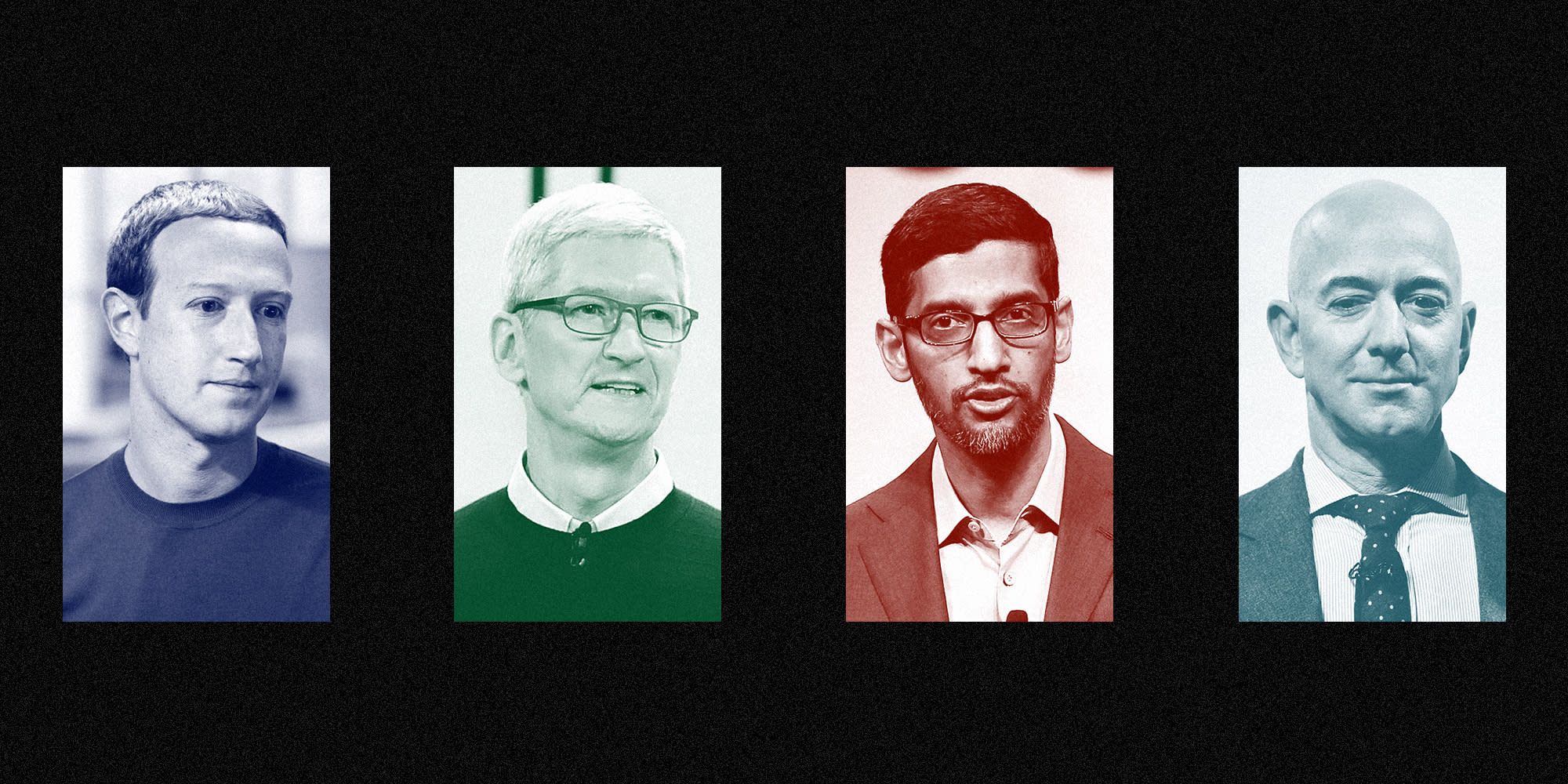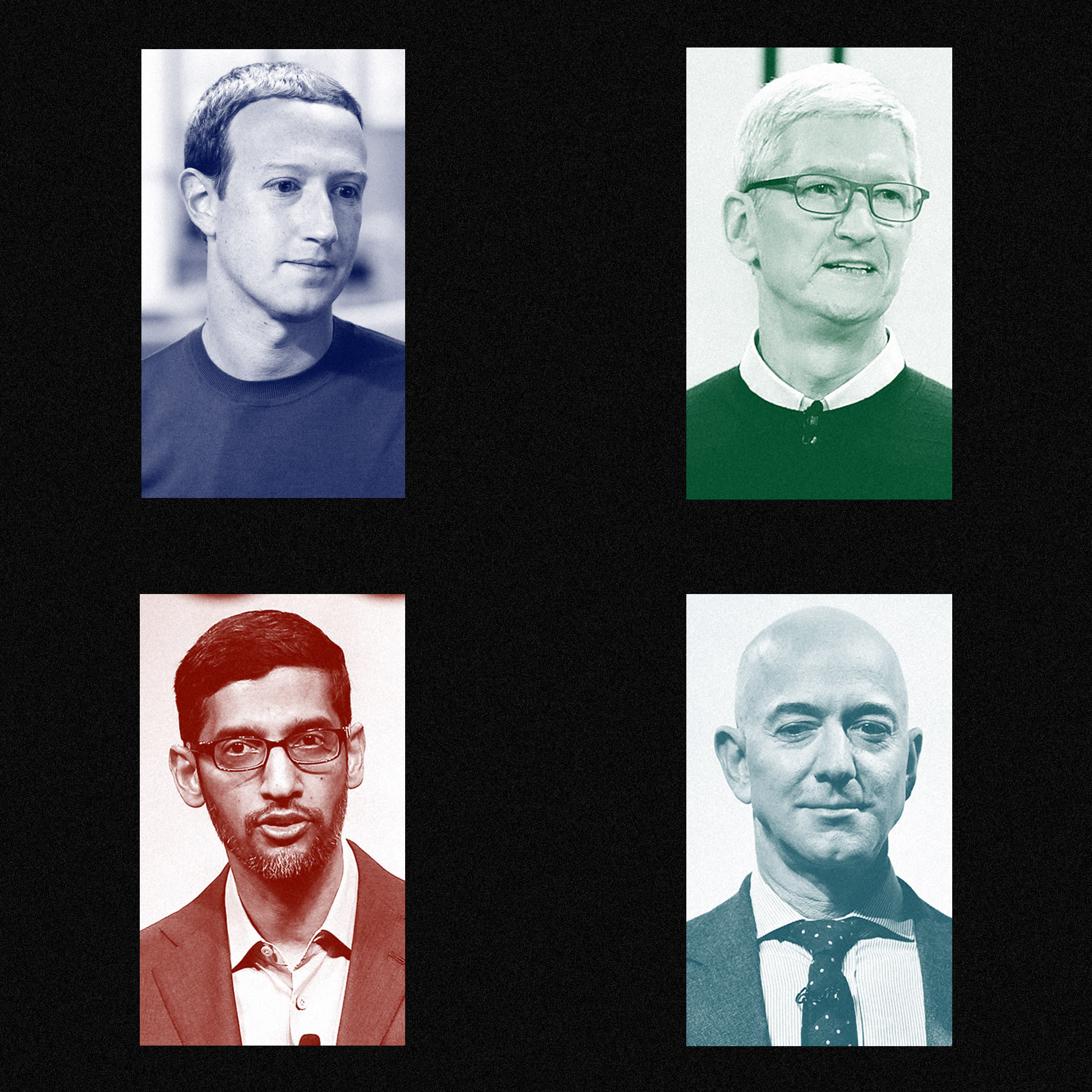In heated hearing, lawmakers say tech 'emperors' hold too much power
David Ingram, NBC News•July 29, 2020


In heated hearing, lawmakers say tech 'emperors' hold too much power
Google came under fire for limiting other websites' traffic, Facebook faced questions about its purchase of Instagram and Amazon was accused of raising diaper prices as lawmakers held a rare congressional hearing Wednesday into whether tech executives have harmed the economy by operating monopolies.
Four major tech CEOs — the other was Apple's chief executive — testified for 5½ hours before a House antitrust subcommittee in a mostly virtual marathon hearing that examined their power in the marketplace.
Subcommittee Chairman David Cicilline, D-R.I., said the CEOs had become "emperors" on the internet.
"Our founders would not bow before a king. Nor should we bow before the emperors of the online economy," Cicilline said. He said the companies have too much power, limiting innovation and choking consumer choice.
Cicilline focused his initial questions on Google, alleging that the search engine company had evolved over the years "from a turnstile for the rest of the web to a walled garden," keeping users on Google's pages rather than sending them elsewhere.
Google CEO Sundar Pichai pushed back, saying that there was vigorous competition among webpages and that users' needs come first. "We have always focused on providing users with the most relevant information," he said.
Judiciary Committee Chairman Jerry Nadler, D-N.Y., raised questions about Facebook's purchase of Instagram in 2012. He quoted from emails ahead of the deal in which Facebook CEO Mark Zuckerberg worried that startups, including Instagram, could be "very disruptive."
The Federal Trade Commission cleared the acquisition, but Nadler said the decision looks wrong now. "It should never have been permitted to happen, and it cannot happen again," he said.
Zuckerberg said Instagram is popular now in large part because of Facebook. "It was not a guarantee that Instagram was going to succeed," he said.
A third CEO, Jeff Bezos of Amazon, faced questions about how his company uses sensitive data from third-party sellers. Bezos said Amazon was investigating a report by The Wall Street Journal this year that Amazon employees had used such data to develop competing products, despite a company policy against that.
"I can't guarantee you that that policy has never been violated," Bezos said in response to questions from Rep. Pramila Jayapal, D-Wash. "If we found that someone violated it, we would take action against them."
Rep. Mary Gay Scanlon, D-Pa., said she was concerned that Amazon had driven up the price of diapers online after buying its primary competitor in that market, Diapers.com, in 2010 and then shutting it down. She said that hurt consumers.
"How would they benefit by the fact that prices were driven up after you eliminated your main competitor?" she asked. Bezos responded that there are still many places to buy diapers.
Apple CEO Tim Cook faced questions about the power of the Apple App Store, saying the company treats all app developers the same.
The hearing before the Judiciary Subcommittee on Antitrust, Commercial and Administrative Law covered an array of subjects, as up to 15 members had the chance to question the executives under oath.
The U.S. rivalry with China was another consistent theme, as lawmakers expressed concern that the tech companies could inadvertently be helping China. The executives, meanwhile, described their companies as bulwarks of American values. The tech industry is an "American success story," Zuckerberg said.
The hearing was an unusual collection of wealth and influence. Two of the four CEOs, Bezos and Zuckerberg, are among the wealthiest people in the world, with more than $265 billion in accumulated wealth between them, according to the Bloomberg Billionaires Index.
Their presence alone made the hearing likely to have been the biggest concentration of corporate wealth ever to appear before Congress.
The corporations they lead are among the world's most valuable and influential, touching the daily lives of billions of people and piling up huge profits even during a pandemic. Apple is valued at $1.6 trillion, Amazon at $1.5 trillion, Google's parent, Alphabet, at $1.04 trillion and Facebook at about $656 billion.
President Donald Trump said in a tweet that he was considering executive orders if Congress does not act.
"In Washington, it has been ALL TALK and NO ACTION for years, and the people of our Country are sick and tired of it!" he said.
Trump has tangled at times with Bezos, attacking him over negative coverage of him in The Washington Post, which Bezos owns. Amazon has blamed Trump's attacks for its failure to land a major government contract last year, and it is suing over the lost deal.
Trump has had somewhat warmer relationships with Zuckerberg, whom he has hosted for a White House dinner, and with Cook, whom he once called "Tim Apple." But Trump's Justice Department is also reported to be preparing an antitrust lawsuit against Google, Pichai's company.
"We're going to be watching the hearings today very closely," Trump said Wednesday. "But there's no question that what the big tech companies are doing is very bad."
Cicilline, who has been investigating the tech industry for more than a year, is preparing a report on possible anti-competitive practices. The report could serve as the basis for legislation.
Cicilline's report will "likely call for Congress to change antitrust laws to make it easier to sue dominant tech companies," Paul Gallant, an analyst with the investment bank Cowen, said in a note to clients this week. "If Democrats sweep in November, that bill has a reasonable chance of enactment" late next year, he said.
The country's major antitrust laws, including the Sherman Antitrust Act of 1890, were written more than a century ago. The Sherman Act, which led to a wave of trustbusting, was the first major U.S. law to restrict monopolies.
Cook of Apple told lawmakers that their scrutiny of the industry was reasonable and appropriate, but like the other executives, he said, "We make no concession on the facts." He said Apple had acted lawfully.
Republican lawmakers on the subcommittee said they were concerned about tech companies' censoring conservatives, although in many cases conservative media flourish on the services.
"Conservatives are consumers, too, and they need the protection of the antitrust laws," said Rep. Jim Sensenbrenner of Wisconsin, the ranking Republican on the subcommittee.
The four executives testified virtually because of the coronavirus pandemic, and some lawmakers also appeared virtually. Of the four, Bezos was the only one who had never testified previously before a congressional panel.
No comments:
Post a Comment